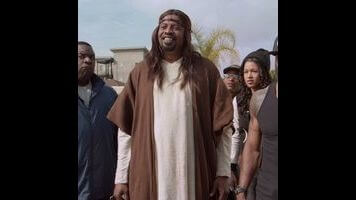The greatest trick Aaron McGruder ever pulled was making a show called Black Jesus utterly non-controversial.
When Adult Swim announced McGruder, the far-left provocateur behind The Boondocks, would be working on a Black Jesus series, it called to mind an early episode of his last project: “A Huey Freeman Christmas,” in which the title character, a 10-year-old radical, stages a Christmas play named The Adventures Of Black Jesus. The play features the talents of Quincy Jones, a samurai, and, of course, a black Jesus, all while instigating conflict within the placid suburb of Woodcrest. It might have been fair to assume that Black Jesus would produce similar levels of uproar. Instead, even Bill Donahue was cool with it—the worst thing the president of the Catholic League had to say about the show was that its version of Jesus was a “mixed bag.”
And that’s a pretty fair critical assessment of Black Jesus. At the end of its first season, it’s basically a low-key, ideologically family-friendly sitcom with a bit more plot and a lot more cursing and weed. This version of Jesus, as played by Gerald “Slink” Johnson, is just a nice dude who wants everyone to be a little nicer to each other, and to themselves (and maybe also give him the last hit on the blunt). If Jesus Christ, Our Lord And Savior returned to Earth and decided to just kick it with his homies and do good work in his community, so what?
Johnson’s easygoing energy does a lot to anchor the other characters surrounding Jesus, who are all pretty basic archetypes otherwise—Boonie the lazy loser (Corey Holcomb), Trayvon the nerd (Andrew Bachelor), Maggie the social media-obsessed gossip (Kali Hawk), and Fish the ex-con (Andra Fuller). Almost all of the actors have decent comic chops, and their characters deepen just enough over the course of the season to justify a little emotional investment. But the crucial players in this cast are the villains. Charlie Murphy and John Witherspoon are both hilariously grumpy and acerbic as Vic the landlord and Lloyd the bum, respectively, and McGruder accordingly forces them into increasingly close proximity. (A late-season reference to Vic and Lloyd as The Odd Couple reads like a cruel tease of what the show might have been.)
Though the first episode serves primarily to introduce Jesus and his crew, the rest of the season explores a single, ongoing plot about their attempt to start a community garden in Compton (to help their neighbors and also grow weed). The obstacles to getting the garden up and running are increasingly ridiculous, but they mostly serve to provide a reason for the cast to get slightly worked up—the back half of the season is surprisingly successful in establishing the show’s vibe, but the finale’s attempt to seriously raise the stakes and bring the story to a climax just feels out of place and forced by comparison.
In fact, even with longer-term plots, Black Jesus is so casual that it sometimes feels as if the show is deploying a sitcom reset button at the end of every episode (or at least the episodes sometimes blur together). That makes sense, since classic sitcoms often read as the biggest influence on the series (there’s literally a “let’s put on a show” episode), particularly in Mike Clattenburg’s direction, which somehow injects a goofy, borderline Looney Tunes-like energy into the proceedings while remaining decidedly unhurried.
Black Jesus’ reliance on some of those tropes allows the show to simply run a lot of standard Christian iconography through a mashup of Pineapple Express and Good Times. Though Vic questions whether Jesus is who he says he is, the show never really threatens to explore this rather dark possibility, and never suggests that ”Pops” doesn’t have a master plan for everyone. Thankfully, as much as McGruder and Clattenburg buy into the ideas of Jesus, that master plan does not include full-on biblical retelling or Boondocks-style political humor. Far from radical, this is a late-period Common or Talib Kweli album: It’ll make you feel good for a while if you like what it’s selling, but it’s certainly not making any big statements.
Besides, nothing ever really feels important enough to get anyone on this show to put their joint down, let alone protest. For the most part, Black Jesus is a pleasant, relatively mindless high, and like an eager-to-please stoner, it’s generally fun to hang out with for 20 minutes at a time. In “A Huey Freeman Christmas,” The Adventures Of Black Jesus play only goes forward because of Mr. Uberwitz, an “irresponsible white person” whose unthinkingly reactive liberal politics lead him to give Huey full creative control before losing his job over the play. That almost a decade later the same concept has produced something so inoffensive, easygoing, and responsible suggests that, just maybe, that irresponsible white person did something right.













![HBO teases new Euphoria, Larry David, and much more in 2026 sizzle reel [Updated]](https://img.pastemagazine.com/wp-content/avuploads/2025/12/12100344/MixCollage-12-Dec-2025-09-56-AM-9137.jpg)



























